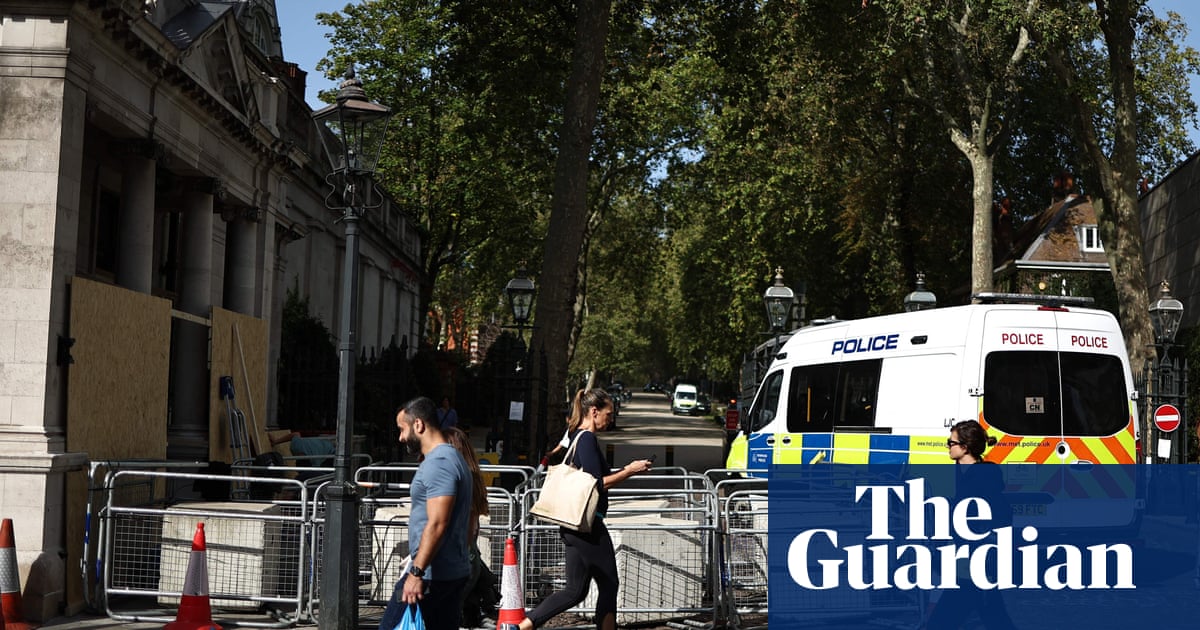Israel’s embassy in London was the target of an alleged terror plot involving a group of Iranian nationals who were detained by police after a series of dramatic raids across England on Saturday, sources have told the Guardian.
Four men remain in custody and are being questioned by police on suspicion of preparation of a terrorist act targeting what police and politicians have so far only been willing to describe publicly as “specific premises”.
Multiple sources told the Guardian that Israel’s embassy in Kensington, west London, was the building in question, though a spokesperson for the embassy did not immediately respond to a request for comment.
On Sunday Yvette Cooper, the home secretary, described the arrests as part of a counter-terrorism operation that reflected some of the biggest threats “we have seen in recent years”.
Police and the Security Service, MI5, believe the plot was at an advanced but not imminent stage when the decision was made to detain the suspects at the weekend. Arrests were made in Swindon, west London, Stockport and Rochdale.
Believing that the attack was ready to be put into action soon, they made the decision to go in with armed officers and special forces to arrest the four men, aged between 29 and 46.
On Tuesday Dan Jarvis, the security minister, said that police officers have been in contact with the affected site’s representatives “to make them aware and provide relevant security advice and support”.
Investigators are trying to establish whether the plot was directed by Tehran, and in particular if one of its security agencies, the ministry of intelligence and security or the Islamic Revolutionary Guard Corps, was involved.
Any attempt to target the Israeli embassy at any level would represent a brazen, risky act against a site that is already highly protected, and would likely lead to serious political repercussions.
At the time of the arrests, investigators believed the suspects were trying to obtain – or had already obtained – weapons to carry out an attack on the embassy.
The decision to arrest was made at a joint executive liaison group involving police and MI5. Searches by police at two sites were still ongoing on Wednesday, four days after the arrests at gunpoint.
Ken McCallum, the head of MI5, said in October thatIranhad been behind “plot after plot” in the UK and that the Security Service had uncovered five new planned attacks last year, taking the total since January 2022 to 20.
In 1992, Israel’s embassy in Argentina was targeted by a suicide bomber, killing 29. A group linked to Hezbollah, an Iranian proxy from Lebanon, claimed responsibility for the attack at the time.
Detectives can hold the suspects involved in the alleged terror plot until Saturday. Then they have to decide whether to charge or release the suspects or apply to a court for further warrants of detention for seven more days.
A fifth Iranian man, 24, who was arrested in the Manchester area, was detained under the Police and Criminal Evidence Act. He has now been released on bail, with conditions, until a date in May.
Ministers and detectives have declined to comment on the immigration status of the arrested men, or whether they entered the country legally or illegally.
Police are already in discussions with the counter-terrorism division of the Crown Prosecution Service (CPS), which authorises criminal charges in England and Wales. A CPS spokesperson said: “We are working with counter-terrorism policing as they continue their investigations.”
Three other Iranian men were also arrested in London by counter-terror police over the weekend on espionage offences in a separate investigation. The men – aged 39, 44 and 55 – were arrested and detained under section 27 of the National Security Act 2023.
